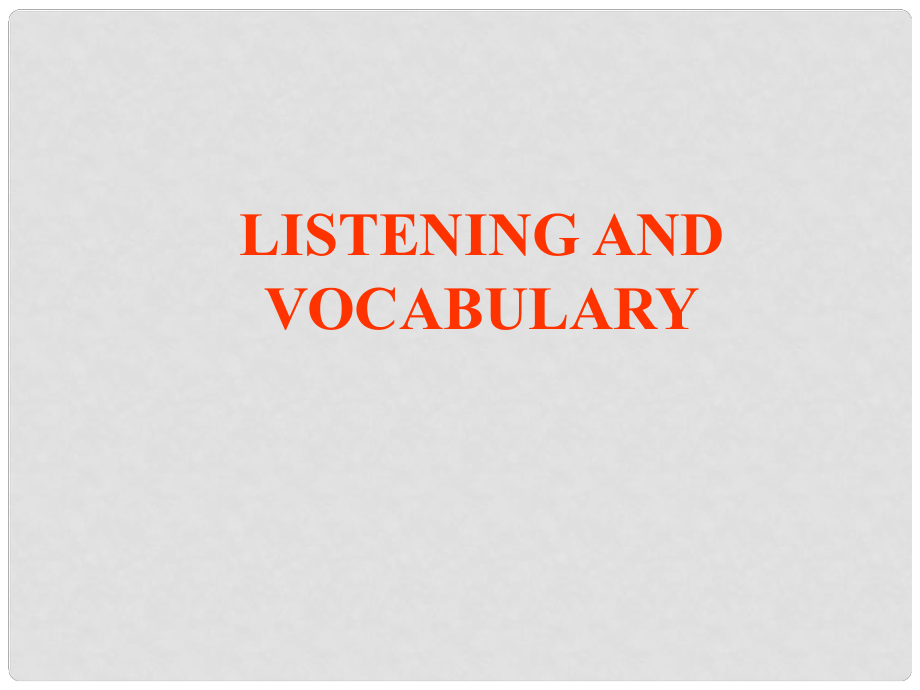《四川省宣漢縣第二中學(xué)高中英語 Module 2 Listening and vocabulary課件 新人教版選修6》由會員分享����,可在線閱讀,更多相關(guān)《四川省宣漢縣第二中學(xué)高中英語 Module 2 Listening and vocabulary課件 新人教版選修6(25頁珍藏版)》請?jiān)谘b配圖網(wǎng)上搜索����。
1、LISTENING AND VOCABULARYCOMPLETE THE SENTENCES WITH THEFOLLOWING WORDS.portrait, oil painting, expression1. A (n) _ is a painting in which you use thick paints that have oil in them.2. The _ on her face is very friendly.3. A (n) _ is a picture of a person. oil paintingexpressionportraitLANDSCAPE, RE
2�、ALISTIC, REALISE4. When you _ something, you notice something that you didnt notice or understand before.5. A (n) _ is a country scene.6. If something is _, it looks great. realise landscape realisticCOMPLIMENT, EXHIBITION, WATERCOLOUR7. A (n) _ painting uses a type of paint that is mixed with water
3、.8. A (n) _ is a public show where people can go and see paintings or photographs.9. A (n) _ is a remark that shows you admire someone or something watercolour exhibition complimentLISTEN TO THE CONVERSATION AND ANSWER THESE QUESTIONS.1. What are the boy and girl discussing? The boys portrait of Pau
4�、l/Visiting an art gallery/ Likes and dislikes.2. Which picture is the boy painting, picture 1 or picture 2? Say how you know this. 1 2Picture 2. Because the girl mentions the light coming through the window.3. WHY DOES THE GIRL SAY SORRY AT THE END OF THE CONVERSATION? BECAUSE SHE THOUGHT THE PICTUR
5、E WAS OF MIKE WHILE ITS OF PAUL. Listen to the conversation again. Complete these sentences.1. The girl likes the portrait because _ _.2. The girl thinks that the light _.its realistic. It has the right expressioncoming in through the window is very good.3. The boy is really fond of _.4. The girl is
6�����、 better at _ than _.5. The boy suggests _.6. The boy likes _ more than _.7. The girl has not recognised _.paintingdrawingpaintinggoing to an art galleryoil paintingswatercoloursthat it is a picture of Paul, not MikeTapescriptGirl: Hey, thats a good portrait. Its so realistic. Youve really got the ex
7�、pression right the look in the eyes.Boy: Yes, Im pleased with it. What do you make of the mouth? Do you think I need to do more work on it?Girl: No, dont change a thing. Its brilliant. And the light coming in through the window is really good. Youre a good painter, you know.Boy: Thanks for the compl
8、iment! Im really fond of painting. But learning to paint well takes a long time. How about you, are you interested in it? Girl: Yes, but Im not half as good as you. Painting is difficult for me. I couldnt possibly paint a portrait as good as this. I think drawings a lot easier. I do quite a lot of d
9����、rawing.Boy: So do I. I always learn a lot when I draw. It teaches you to observe things carefully. Do you go to art galleries?Girl: No, I dont. But I should, I know. I really do love art.Boy: Well, how about going to an art gallery next weekend? Im sure we can find something interesting.Girl: Id lov
10、e to.Boy: Theres a pop art exhibition on at the moment.Girl: Um, I dont like pop art.Boy: Nor do I, really. I know, theres an exhibition of water colours on at the same gallery.Girl: Oh, that sounds interesting. I love water colours.Boy: Do you? I prefer oil paintings, myself. But Id still like to g
11���、o.Girl: Lets do that thenAnd I do think your picture of Mike is wonderful.Boy: Mike? Its not a picture of Mike! Its a picture of Paul!Girl: Paul? Its a picture of Paul? Oh! I didnt realise that. Sorry!疑難句分析疑難句分析1. Youve really got the expression right-the look in the eyes. 你真的抓住了表情你真的抓住了表情-(我是說我是說)眼
12����、神�。眼神。 expression在本句中表示在本句中表示“表情表情,臉臉色色”, look則表示則表示“眼神眼神, 神情神情”���。2. What do you make of the mouth? 你認(rèn)為嘴部你認(rèn)為嘴部(畫得畫得)怎么樣�?怎么樣�����? What do you make of sth?該句式常用該句式常用 來征求別人的意見或看法��。相當(dāng)于來征求別人的意見或看法��。相當(dāng)于 What do you think of sth?/How do you like sth? 3. And the light coming in through the window is really good. 而且
13����、從窗戶射進(jìn)來的光線真的而且從窗戶射進(jìn)來的光線真的(表現(xiàn)的表現(xiàn)的)很好。很好。本句中本句中coming in through the window為為現(xiàn)在分詞作定語修飾現(xiàn)在分詞作定語修飾the light��。4. It teaches you to observe things very carefully. 它教你仔細(xì)地觀察事物���。它教你仔細(xì)地觀察事物�����。 observe 的用法的用法 1) vt. & vi.看或注意到看或注意到(不用于進(jìn)行時(shí)不用于進(jìn)行時(shí)) Scientists have observed a drop in ozone levels over the Antarctic. 科學(xué)家
14���、們已觀察到南極上空臭氧層的科學(xué)家們已觀察到南極上空臭氧層的減少。減少���。 It was observed that 40 percent of patients had high blood pressure. 據(jù)觀察有百分之四十的病人有高血壓�。據(jù)觀察有百分之四十的病人有高血壓�。 They observed him driving at 90 miles per hour. 他們看到他以每小時(shí)他們看到他以每小時(shí)90英里的速度英里的速度 駕駛。駕駛���。2) vt. & vi.仔細(xì)觀察仔細(xì)觀察 The police have been observing his movements. 警察一直在關(guān)注著
15��、他的動向��。警察一直在關(guān)注著他的動向��。 Observe how the people in the group interact. 注意觀察組里的人們是如何互動的���。注意觀察組里的人們是如何互動的�。 One performs the experiment, while others observe. 一個(gè)人做實(shí)驗(yàn)����,其他人觀看����。一個(gè)人做實(shí)驗(yàn),其他人觀看�。3) vt. 說或?qū)懻f或?qū)?“Mary looks ill”, she observed. “瑪麗好像病了瑪麗好像病了”,她說�。,她說����。 He observed that human falls into two classes. 他認(rèn)為人分為兩類。
16����、他認(rèn)為人分為兩類。5. Theres a pop art exhibition on at the moment. 現(xiàn)在一個(gè)流行藝術(shù)展正在進(jìn)行?��,F(xiàn)在一個(gè)流行藝術(shù)展正在進(jìn)行����。 on在本句中表示在本句中表示“正在進(jìn)行正在進(jìn)行”的意思。的意思��。6. Oh, I didnt realise that. 哦哦, 我沒有意識到我沒有意識到(那是那是Paul的畫像的畫像)��。 注意注意:本句中的沒有意識到是在男孩告本句中的沒有意識到是在男孩告訴她之前訴她之前, 因而表述的是過去的事因而表述的是過去的事, 應(yīng)應(yīng)用過去時(shí)�����。用過去時(shí)��。REALISE 1) 知道知道; (突然突然)理解或意識到理解或意識到 I sud
17���、denly realised that he was lying.我突然意識到他到撒謊�����。我突然意識到他到撒謊����。 It was only later that I realised my mistake. 直到后來我才意識到我的錯誤���。直到后來我才意識到我的錯誤�����。2) 使使(理想等理想等) 成為現(xiàn)實(shí)成為現(xiàn)實(shí) She never realized her dream of winning an Olympic gold medal. 她從未實(shí)現(xiàn)拿奧林匹克金牌的夢想�����。她從未實(shí)現(xiàn)拿奧林匹克金牌的夢想���。 He works very hard to realise his ambition. 為了實(shí)現(xiàn)他的宏偉目標(biāo)為了實(shí)現(xiàn)他的宏偉目標(biāo), 他每天努力他每天努力工作。工作��。
 四川省宣漢縣第二中學(xué)高中英語 Module 2 Listening and vocabulary課件 新人教版選修6
四川省宣漢縣第二中學(xué)高中英語 Module 2 Listening and vocabulary課件 新人教版選修6

